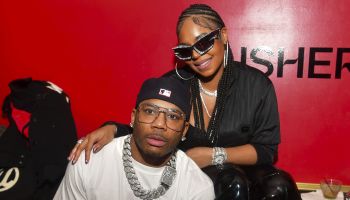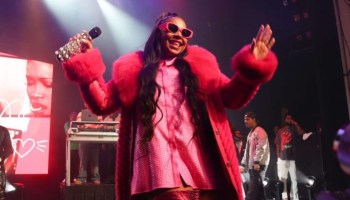He steadies himself with a cane these days, and his hands tremble from the effects of Parkinson’s disease. But Tom Richards’ maladies were minor inconveniences as he stood on the sidewalk Saturday night outside a popular bar in the heart of Houston’s gay community. Minutes earlier, Annise Parker had just been elected as the first openly gay mayor of a major American city.
“This is history,” said Richards, a 66-year-old Vietnam War veteran. “This ol’ man thought he was gonna die before he ever saw something like this.”
Houston’s gay community, an estimated 60,000 people, shared Richards’ pride and sense of history. They also took pride in the fact that throughout Parker’s nearly year-long quest, they provided the campaign elbow grease for one of their own.
Media ranging from the New York Times to the Tulsa World, from The Guardian in London to The Age in Melbourne, Australia, spotlighted Parker’s sexual orientation. Commentators seemed astounded that Texans would elect a gay mayor, despite the fact that at least 20 public officials in the Lone Star State are acknowledged gays or lesbians, including the sheriff of Dallas County.
Parker’s victory was due, in large part, to the local perception that she was not “the gay candidate” — in the same way that Barack Obama, although black, was not the black candidate and Hillary Clinton, although female, was not the female candidate. She was the experienced public official who happened to be gay.
Although voters initially got to know Parker in the 1980s as an activist on behalf of gay rights, they soon grew familiar with her as an elected official. She was elected six times, first to City Council and then as city controller. She never tried to hide her sexual orientation, but neither did she make it the key “data point” of her public identity.
“In the early days, it was important that she define herself,” said Grant Martin, who has run Parker’s campaigns since 1997. “Her strategy was as much proactive as reactive. We didn’t want her sexual orientation to be essentially announced to voters as a bad thing late in the game. So, in appropriate ways, we would announce it — listing in her campaign literature that she was president of the GLBT Political Caucus, things like that.”
Skeptical establishment
Still, the putative king-makers remained skeptical that she had a more ambitious political future. In the early days and weeks of her campaign, trooping around town seeking endorsements and money to run a credible campaign, she was told by denizens of the downtown towers, those with the power to flick open the money spigots, that Houston simply wouldn’t elect a gay mayor.
With the business establishment skeptical that a gay candidate could be elected, money was a problem until she came in first in the Nov. 3 general election, Parker said. So she turned to her most reliable constituency, the gay community, the same people who had posted the signs, walked the blocks and made the election-day phone calls throughout her political career.
She also found support from national gay and lesbian organizations, including the Human Rights Campaign, Stonewall Democrats and the Gay & Lesbian Victory Fund.
“We endorse candidates with an eye toward giving them a platform, not necessarily to advance an agenda, but to show the larger community that we’re really no different than they are, that we’re interested in potholes and taxes and public schools,” said Dennis Dison, a vice president of the Victory Fund.
Nationwide support
The organization’s endorsement, which Parker has received for each of her races, makes a candidate eligible for money from the group’s political action committee and provides access to a nationwide network of donors. Parker received more than $400,000 from the group.
The Victory Fund also offers advice on how a gay candidate should run a campaign, although Parker’s experience made that unnecessary.
Parker learned early in her career how to balance the political basics with the basic fact of her sexual orientation.
“I expect there were a lot of people who suspected that Annise Parker would be the best person to watch over their tax dollars, even if they were a little uncomfortable with her sexual orientation,” Martin said.
Sexual politics was secondary. Asked, for example, about a proposed referendum on providing benefits to same-sex partners of city workers, Parker said she had no plans along those lines.
“There really are no gay issues to fight out in Houston,” Martin said. “Domestic partners is in the charter; a mayor can’t do anything about that. It’s the budget, potholes, police cadet classes, things like that.”
Her pragmatic political awareness did not diminish the pride of accomplishment Houston gays felt Saturday.
“Annise’s election shows that a gay or lesbian Texan has as much of an opportunity to serve their city as any other Texan,” said Daniel Williams, 30, a campaign volunteer who was celebrating Saturday night in Montrose.
Special moment
Parker’s victory was particularly gratifying for older activists like Richards and 69-year-old Ray Hill.
Hill, tall and gray-bearded, was a co-founder of the organization that became the GLBT Political Caucus in Houston. The outspoken dean of gay activists in Harris County, he came out of the closet in 1958 and was an instigator of a historic 1976 gay rights march in downtown Houston and has been an activist ever since.
“I have literally waited 40 years for this election. I’m not exaggerating,” he said.
Hill said he didn’t expect the new mayor to use her office to champion gay rights.
“Annise is a policy wonk and a process wonk,” he said. “Now, that she is there, I have someone we know will listen to our issues and complaints, but it’s the activists’ job to bring about the impetus for change. It’s not the mayor’s job.”













